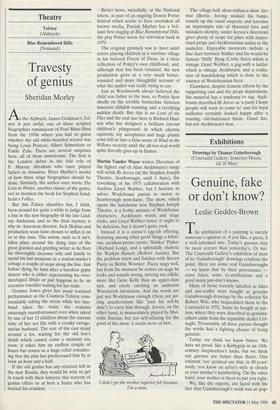Theatre
Tolstoy (Aldwych) Blue Remembered Hills (National)
Travesty of genius
Sheridan Morley
Athe Aldwych, James Goldman's Tol- stoy is just awful, one of those scripted biographies reminiscent of Paul Muni films from the 1930s where you had to guess whether the old white-bearded wizard was being Louis Pasteur, Albert Schweitzer or Emile Zola. There are several surprises here, all of them unwelcome. The first is the London debut in the title role of F. Murray Abraham who once played Salieri in Amadeus, Peter Shaffer's model of how these stage biographies should be done. Similarly, the author once wrote The Lion in Winter, another classic of the genre, not to mention the book for Stephen Sond- heim's Follies.
But this Tolstoy shambles has, I think, been around for quite a while to judge from a line in the new biography of the late Lind- say Anderson, and so the final mystery is why its American director, Jack Hofsiss and production team have chosen to inflict it on us at this time. The action, such as it isn't, takes place around the dying days of the great grizzled and grizzling writer as he flees his thoroughly tiresome wife and family to spend his last moments in a station-master's cottage a couple of stops along the line. Just before dying, he lusts after a barefoot gypsy dancer who is either representing his over- developed libido or just happens to be an eccentric traveller waiting for her train.
Gemma Jones gives her usual tortured performance as the Countess Tolstoy com- mendably taking the strain while her hus- band takes the train; she remains amazingly unembarrassed even when asked by one of her 13 children about the current state of her sex life with a cranky octoge- narian husband. The rest of the cast stand around a lot, waiting for the old boy's death which cannot come a moment too soon: it takes him an endless couple of hours but comes as a huge relief consider- ing that the play has predeceased him by at least an hour and a half.
If the old genius has any relatives left in the new Russia, they would be wise to get in touch with their lawyers; this travesty of genius offers us at best a Santa who has mislaid his reindeer. Better news, mercifully, at the National where, as part of an ongoing Dennis Potter festival which seems to have overtaken all known media, Patrick Marber has a bril- liant first staging of Blue Remembered Hills, the play Potter wrote for television back in 1979.
The original gimmick was to have adult actors playing children in a wartime village in his beloved Forest of Dean, in a clear reflection of Potter's own childhood, and, although that has been retained, the new production gives us a very much better- rounded and more thoughtful account of what the author was really trying to say.
Just as Wordsworth always believed the child was father to the man, so Potter here dwells on the terrible borderline between innocent childish taunting and a terrifying sudden death. But this is no Lord of the Flies and the real star here is Richard Hud- son who has designed a brilliant cut-out children's playground in which electric squirrels, toy aeroplanes and huge plastic cows lull us into a false sense of Wind in the Willows security until the all-too-real world quite literally goes up in flames.
Martin Vander Weyer writes: Devotees of the lighter end of Alan Ayckbourn's range will relish By Jeeves (at the Stephen Joseph Theatre, Scarborough, until 1 June), the reworking of his 1975 collaboration with Andrew Lloyd Webber, but I hesitate to advise Wodehouse purists to motor to Scarborough post-haste. The show, which opens the handsome new Stephen Joseph Theatre, is a frothy mixture of Wodehouse characters, Ayckbourn words and stage tricks, and Lloyd Webber tunes: it ought to be delicious, but it doesn't quite cook.
Instead it is a curate's egg-ish offering, featuring among other good things a hilari- ous, accident-prone curate, 'Stinker' Pinker (Richard Long), and a splendidly choleric Sir Watkyn Bassett (Robert Austin). But the problem starts and finishes with Steven Pacey as Bertie Wooster: Pacey sings well, but from the moment he comes on stage he looks and sounds wrong, moving too silkily, more like Gene Kelly than an upper-class twit, and rarely catching an authentic Woosterish intonation. And the words are just not Wodehouse enough (there are jar- ring anachronisms like 'past his sell-by date') to carry him through. Jeeves, on the other hand, is immaculately played by Mal- colm Sinclair, but too self-effacing for the good of the show: it needs more of him.
I didn't get the mother superior job because I'm a man.' The village-hall show-within-a-show for- mat (Bertie, having mislaid his banjo, rounds up the usual suspects and narrates an impromptu tale of thwarted love and mistaken identity, under Jeeves's direction) gives plenty of scope for jokes with impro- vised props and Ayckbournian asides to the audience. Enjoyable moments include a fine duet between Stinker and his would-be fiancee `Stiffy' Byng (Cathy Sara) which is vintage Lloyd Webber, a gag with a ladder which is vintage Ayckbourn, and a confu- sion of handshaking which is close to the essence of Wodehousian farce.
Elsewhere, despite frenetic efforts by the supporting cast and the props department, the material has a tendency to sag. Ayck- bourn described By Jeeves as 'a party I hope people will want to come to' and his loyal audience certainly looked happy after a rousing, old-fashioned finale. Good fun, but not Ayckbourn's best.


































































 Previous page
Previous page